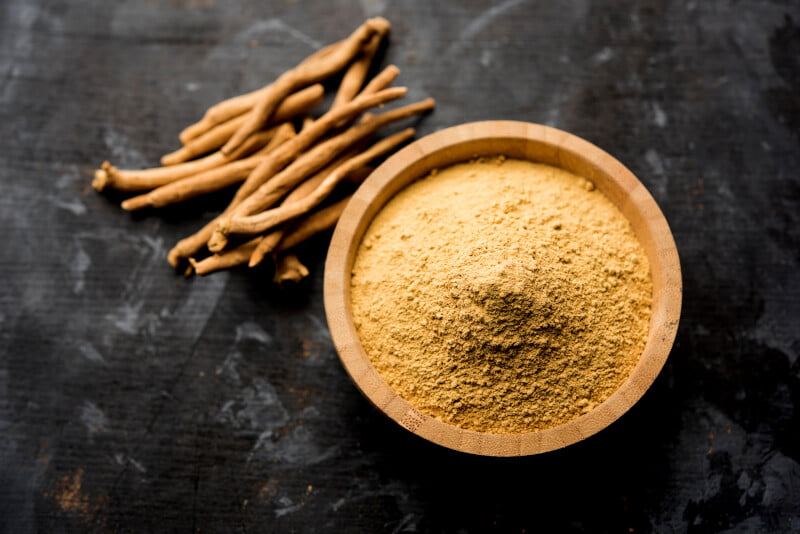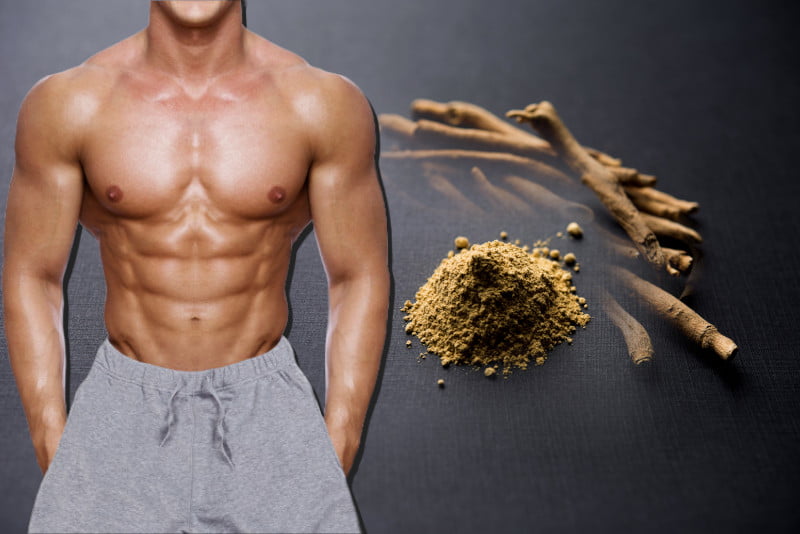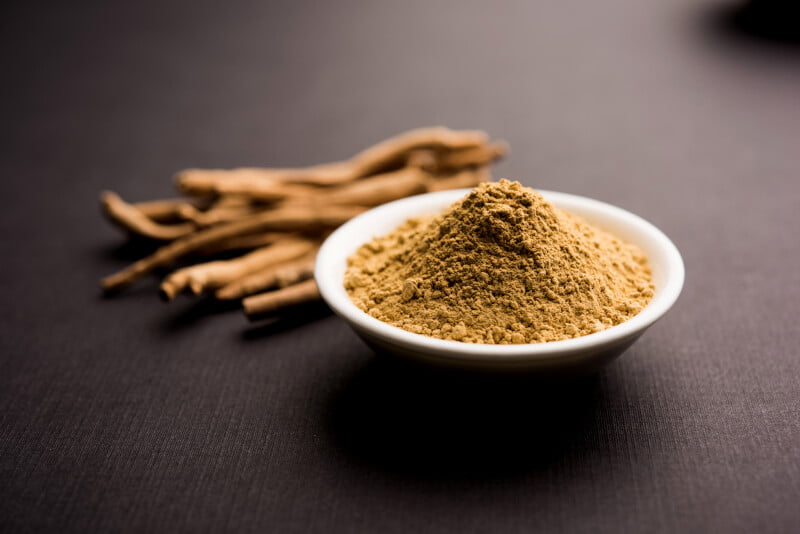Regulating reproductive hormone levels can be difficult as we age when the body starts its natural decline.
Hence, the use of Ayurvedic medicine becomes a wise choice for boosting testosterone levels, which leads to increased muscle mass, improved sexual health, and reduced stress.
While there are numerous alternative medicines on the market, Ashwagandha supplementation is one of the few organic remedies that have shown promise.
Read more to find out what Ashwagandha is and its benefits.
What is Ashwagandha?
Ashwagandha, also known as Withania somnifera, is an Ayurvedic medicine that is believed to increase male hormonal and vitality effects.


Withania somnifera is recommended as a supplement for men who are experiencing the following:
- Stress related-male fertility issues
- General chronic stress
- Increased body fat
- Loss of muscle strength
Ashwagandha is one of the few traditional medicines and adaptogens connected to masculinity and the treatment of low testosterone.
For some, it is debatable whether Ashwagandha root extract can enhance testosterone.
However, one placebo-controlled study(1) revealed the following:
- Ashwagandha and testosterone may have a direct relationship, as per the results found in the placebo group.
- It was also found that the higher the intake of Withania somnifera, the higher the resistance training, the lower the stress hormone, and the stronger the muscle and bone mass.
Hence, a healthcare provider may recommend Withania somnifera supplementation as it may rapidly increase T-levels, improve semen quality, and help infertile males.
DISCLAIMER: More studies are needed to back up the findings of this double-blind, placebo-controlled study.
Pros
- Relieves cough and cold
- Increase red and white cells
- Reduce cortisol levels
Cons
- Lack of sleep or Insomnia
- Nausea and vomiting
How Does Ashwagandha Work?
Since Ashwagandha is regarded as an adaptogen, it helps the body's numerous systems stay balanced.
This Indian ginseng is proven by clinical trials to balance the stress hormone(2) and reproductive hormone levels(3) of the human body.


As a result, significant improvements in testosterone levels can lead to improved semen quality, muscle mass, and muscle strength.
Additionally, it has strong anti-oxidant qualities(4) that aid in preventing cellular damage brought on by free radicals.
Benefits of Ashwagandha
Numerous medicinal effects of the plant have been discovered through research. It is proven to:
- Lower Blood Sugar Levels - Adding Ashwagandha was found(5) to enhance insulin secretion and insulin sensitivity, which in turn can reduce blood sugar levels. Withania somnifera is believed to have a significant increase in health benefits and is the best alternative medicine for regulating reproductive hormone levels.
- Reduce Anxiety and Depression - For chronically stressed adults, Ashwagandha is quite effective(6) in treating many neuropsychiatric conditions, including dementia and depression. These herbal supplements' qualities assist in calming the mind, lessening irritation, and increasing energy and stamina.


- Treat Insomnia - Ashwagandha's relaxing and anxiolytic qualities assist in reducing tension and anxiety. It eases mental weariness, helps the mind let go of upsetting thoughts, and enhances sleep. In a placebo-controlled study(7), it was found that Ashwagandha root was effective for people who were experiencing insomnia.
- Enhance Immunity - The active compounds in Ashwagandha root increase the body's vitality(8) while reducing weakness and exhaustion. This makes it valuable for raising the body's overall level of energy and stamina. Additionally, it helps the adrenal glands perform better, lowering stress levels.


- Increase Male Sperm Quality - There is a significant correlation between Ashwagandha and testosterone production in the seminal plasma. According to a randomized, double-blind placebo study, males who took Ashwagandha to reduce stress had higher antioxidant levels and higher-quality sperm(9). Withania somnifera has a significant increase in sperm predictability for infertile males! So if you have stress-related male infertility, Withania somnifera is a wise choice for significantly increasing semen quality and seminal plasma.
- Reduce Inflammation - One of the most common diseases today is chronic inflammation, and Ashwagandha is one of the finest treatments. It has been discovered to reduce C-reactive protein, a sign of inflammation, by 36%(10).


- Help Strengthen Muscle - In a study(11) to identify the safest Ashwagandha dosage for adults, it was discovered that previously healthy individuals had decreased fat and increased muscle mass.
- Enhance Mental Abilities - Ayurveda has always claimed that it enhances memory, and studies on humans(12) have revealed that it does. More intriguingly, numerous research on animals(13) and in test tubes have discovered that it lessens the mental issues brought on by illness and injury.
How Does Ashwagandha Boost Testosterone?
It is well known that Ashwagandha has potent antioxidant qualities. Consuming Ashwagandha may shield testicular cells from oxidative deterioration.
Less damage to the testes may support T-levels as the testes are where the majority of testosterone is created.


Ashwagandha has also been shown to boost luteinizing hormone synthesis. The pituitary gland produces the hormone that supports the reproductive system.
The luteinizing hormone basically causes the creation of testosterone in men. More testosterone may result from higher hormone concentrations.
Most notably, the anti-stress effects of Ashwagandha may play a significant role in raising T-levels.
Keep in mind that prolonged stress and a high cortisol level can have a variety of physiological repercussions.
Cortisol may affect testosterone levels and functions, and high amounts of stress, especially oxidative stress, can impact libido and semen quality.
An Ashwagandha pill, which functions as a natural testosterone booster, may help lessen oxidative stress in the body and some of the signs and symptoms of low testosterone.
How to Use Ashwagandha
For its medicinal benefits, Ashwagandha can be taken in supplement capsules, tablets, powder, tinctures, and teas:
- As Tablets or Capsules of Ashwagandha - Take one tablet or as per your professional medical advice. Consume it twice daily with warm milk. Also, it is preferable to consume Ashwagandha capsules right after eating.


- As Ashwagandha Powder - In a randomized, double-blind placebo study, it was found(14) that two doses of 300mg Withania somnifera powder daily improved sleep quality and SOL (sleep onset latency) in patients with insomnia. You may pair this with warm milk or honey for a better taste.
- Milkshake With Ashwagandha - If you want to be creative while still gaining various health benefits, you may make a Withania somnifera or Ashwagandha milkshake:
- Roast about four tablespoons of Ashwagandha.
- Put a couple of tablespoons of honey to add some taste. (however, if you have high sugar, you should refrain from adding honey.)
- Add a cup of chilled milk.
- Blend the mixture thoroughly.
- Drink right away for better flavor.
- Ashwagandha Tea - If you want to utilize Ashwagandha more traditionally, making it a tea is one of the best examples! Just add two cups of water and then add a spoonful of Ashwagandha powder. After that, boil the mixture until it has reduced by half, and add some honey and milk to add some flavor.
Potential Side Effects of Ashwagandha
Utilizing Ashwagandha is generally risk-free, but taking it more frequently can lead to risks rather than health benefits.
Listed below are the associated health risks when taking this Ayurvedic medicine abusively:
- Might Lead to Liver Damage - It was discovered that patients who used Ashwagandha-containing commercial herbal medicines had liver damage(15).
- May Drastically Reduce Blood Sugar Levels - Ashwagandha has been shown in randomized controlled trial studies to reduce blood sugar levels(16). However, someone taking diabetes medicine might find this to be ineffective.
- Could Worsen Hyperthyroidism - It is well known that Ashwagandha raises thyroid hormone levels and leads to a significant increase in testosterone levels. Consequently, persons who have hyperthyroidism may encounter unpleasant symptoms. Before taking Ashwagandha, people with hypothyroidism should also speak to their doctor because the herb may interact with their prescriptions for their condition.
Hence, as listed above, it's crucial to see your doctor before taking any new supplements, including Ashwagandha, if you use other prescriptions or already have health difficulties.
Even if you alter your lifestyle and add supplements to your diet, you can still have a health issue causing low testosterone levels.
To ascertain the underlying source of hormone fluctuations, always speak with your healthcare professional first!
Who Should Avoid Ashwagandha?
Ashwagandha may have a lot of health benefits, but it is NOT for everyone. Listed below are the people who SHOULD AVOID Ashwagandha:
- Pregnant Women - Ashwagandha might cause issues if taken when pregnant (although more studies are needed to prove this). Nevertheless, pregnant women should refrain from taking this herbal supplement just to be safe. Treatment with Ashwagandha supplements may produce mild to moderate stomach discomfort for adults with stomach ulcers. Also, Ashwagandha is not recommended for adults with stomach ulcers since it may worsen their symptoms.


- Adult Patients With Autoimmune Disorders - The immune system may become more active after Ashwagandha therapy. Adults with any autoimmune condition, including lupus, multiple sclerosis, or rheumatoid arthritis, should not take this product. Ashwagandha's improper use could worsen the symptoms of your illness.
- Adults Taking Particular Medications - Taking Ashwagandha supplements might not be a good idea if you're taking certain prescription drugs. Ashwagandha shouldn't be used with immunosuppressants such as prednisone, azathioprine, cyclosporine, or basiliximab. Ashwagandha could make you sleepy; thus, it shouldn't be taken with other sedative drugs like lorazepam, alprazolam, zolpidem, or phenobarbital. Ashwagandha should not be taken with other thyroid hormone medications since it may cause an increase in thyroid hormone production.
FAQs Regarding Ashwagandha and Its Role in Boosting Testosterone Levels
We know that increasing T-levels may have a lot of questions, so this section is intended to answer all your queries and more:
How long does Ashwagandha take to boost testosterone?
For Ashwagandha to be effective, it must be taken consistently for eight weeks to cause a considerable rise in testosterone levels. This has been backed up by a recent study(17) of overweight and mildly fatigued males aged 40 to 70 who took an ashwagandha supplement for eight weeks. After which, they had increased levels of testosterone.
How much Ashwagandha should I take to increase testosterone?
It is suggested to take a 250-600 mg dose of Ashwagandha per day to improve your testosterone levels, enhance sleep quality, and help your body with stress management.
How much does Ashwagandha increase testosterone production?
Men between the ages of 40 to 70 who took an Ashwagandha extract supplement exhibited an average increase in testosterone levels of about 15%(18) and are reported to have an increase in DHEA, a hormone that aids in testosterone production for about 18%.
Can Ashwagandha root extract cause high testosterone?
Compared to the placebo, Ashwagandha root extract consumption was believed to be linked(18) to an 18% larger increase in DHEA and a 14.7% greater increase in testosterone. This is because it is taken directly and does not go through a manufacturing process.
How does Ashwagandha impact cortisol levels, anxiety, and mental health?
The benefits of Ashwagandha for reducing stress are well known. The therapeutic plant appears to assist in reducing cortisol levels, a hormone your adrenal glands generate in response to stress. More specifically, it has been demonstrated that daily doses of 125 mg to 5 grams for 1-3 months reduce cortisol levels by 11-32%(19).
Is Ashwagandha good for muscle strength and building muscle mass?
In clinical trials, 57 males used Ashwagandha(17), and substantial gains in muscular mass and strength were observed. Ashwagandha root supplementation is one of the best organic testosterone and muscle-building supplements you can find if you want rapid physique changes.
Conclusion: Does Ashwagandha Increase Testosterone?
Yes, it does. Ashwagandha is a good organic supplement you can definitely try if you're suffering from various symptoms of low testosterone.
Withania somnifera helps lower blood sugar levels, reduce anxiety and depression, increase sperm production, and strengthen muscles.


However, along with its health benefits, it can also have a fair share of risks when taken improperly (e.g., liver damage, worsening of hypothyroidism, and worsening of autoimmune diseases).
With that, Withania somnifera or Ashwagandha should be taken IN MODERATION to get the intended benefits.
- Lopresti, Adrian L et al. “A Randomized, Double-Blind, Placebo-Controlled, Crossover Study Examining the Hormonal and Vitality Effects of Ashwagandha ( Withania somnifera) in Aging, Overweight Males.” American journal of men's health vol. 13,2 (2019): 1557988319835985. doi:10.1177/1557988319835985↩
- Salve, Jaysing et al. “Adaptogenic and Anxiolytic Effects of Ashwagandha Root Extract in Healthy Adults: A Double-blind, Randomized, Placebo-controlled Clinical Study.” Cureus vol. 11,12 e6466. 25 Dec. 2019, doi:10.7759/cureus.6466↩
- Nasimi Doost Azgomi, Ramin et al. “Effects of Withania somnifera on Reproductive System: A Systematic Review of the Available Evidence.” BioMed research international vol. 2018 4076430. 24 Jan. 2018, doi:10.1155/2018/4076430↩
- Ahmed, Wafaa et al. “Antioxidant activity and apoptotic induction as mechanisms of action of Withania somnifera (Ashwagandha) against a hepatocellular carcinoma cell line.” The Journal of international medical research vol. 46,4 (2018): 1358-1369. doi:10.1177/0300060517752022↩
- Gorelick, Jonathan et al. “Hypoglycemic activity of withanolides and elicitated Withania somnifera.” Phytochemistry vol. 116 (2015): 283-289. doi:10.1016/j.phytochem.2015.02.029↩
- Speers, Alex B et al. “Effects of Withania somnifera (Ashwagandha) on Stress and the Stress- Related Neuropsychiatric Disorders Anxiety, Depression, and Insomnia.” Current neuropharmacology vol. 19,9 (2021): 1468-1495. doi:10.2174/1570159X19666210712151556↩
- Cheah, Kae Ling et al. “Effect of Ashwagandha (Withania somnifera) extract on sleep: A systematic review and meta-analysis.” PloS one vol. 16,9 e0257843. 24 Sep. 2021, doi:10.1371/journal.pone.0257843↩
- Choudhary, Bakhtiar et al. “Efficacy of Ashwagandha (Withania somnifera [L.] Dunal) in improving cardiorespiratory endurance in healthy athletic adults.” Ayu vol. 36,1 (2015): 63-8. doi:10.4103/0974-8520.169002↩
- Ambiye, Vijay R et al. “Clinical Evaluation of the Spermatogenic Activity of the Root Extract of Ashwagandha (Withania somnifera) in Oligospermic Males: A Pilot Study.” Evidence-based complementary and alternative medicine : eCAM vol. 2013 (2013): 571420. doi:10.1155/2013/571420↩
- Auddy, Biswajit, et al. ‘A Standardized Withania Somnifera Extract Significantly Reduces Stress-Related Parameters in Chronically Stressed Humans: A Double-Blind, Randomized, Placebo-Controlled Study’. Journal of American Nutraceutical Association, vol. 11, Nov. 2008, pp. 50–56↩
- Wankhede, Sachin et al. “Examining the effect of Withania somnifera supplementation on muscle strength and recovery: a randomized controlled trial.” Journal of the International Society of Sports Nutrition vol. 12 43. 25 Nov. 2015, doi:10.1186/s12970-015-0104-9↩
- Pingali, Usharani, et al. “Effect of Standardized Aqueous Extract of Withania Somnifera on Tests of Cognitive and Psychomotor Performance in Healthy Human Participants.” Pharmacognosy Research, vol. 6, no. 1, EManuscript Technologies, Jan. 2014, pp. 12–18, doi:10.4103/0974-8490.122912.↩
- Priyanka, G., et al. “Adaptogenic and Immunomodulatory Activity of Ashwagandha Root Extract: An Experimental Study in an Equine Model.” Frontiers in Veterinary Science, vol. 7, 2020, doi:10.3389/fvets.2020.541112.↩
- Langade, Deepak et al. “Efficacy and Safety of Ashwagandha (Withania somnifera) Root Extract in Insomnia and Anxiety: A Double-blind, Randomized, Placebo-controlled Study.” Cureus vol. 11,9 e5797. 28 Sep. 2019, doi:10.7759/cureus.5797↩
- Björnsson, Helgi K et al. “Ashwagandha-induced liver injury: A case series from Iceland and the US Drug-Induced Liver Injury Network.” Liver international : official journal of the International Association for the Study of the Liver vol. 40,4 (2020): 825-829. doi:10.1111/liv.14393↩
- Durg, Sharanbasappa et al. “Withania somnifera (Indian ginseng) in diabetes mellitus: A systematic review and meta-analysis of scientific evidence from experimental research to clinical application.” Phytotherapy research : PTR vol. 34,5 (2020): 1041-1059. doi:10.1002/ptr.6589↩
- Wankhede, Sachin et al. “Examining the effect of Withania somnifera supplementation on muscle strength and recovery: a randomized controlled trial.” Journal of the International Society of Sports Nutrition vol. 12 43. 25 Nov. 2015, doi:10.1186/s12970-015-0104-9↩↩
- Lopresti, Adrian L et al. “A Randomized, Double-Blind, Placebo-Controlled, Crossover Study Examining the Hormonal and Vitality Effects of Ashwagandha ( Withania somnifera) in Aging, Overweight Males.” American journal of men's health vol. 13,2 (2019): 1557988319835985. doi:10.1177/1557988319835985↩↩
- Chandrasekhar, K et al. “A prospective, randomized double-blind, placebo-controlled study of safety and efficacy of a high-concentration full-spectrum extract of ashwagandha root in reducing stress and anxiety in adults.” Indian journal of psychological medicine vol. 34,3 (2012): 255-62. doi:10.4103/0253-7176.106022↩
